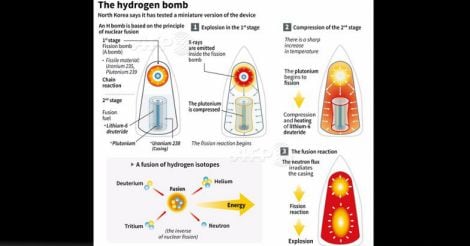New Delhi: India was among the countries, which strongly condemned the hydrogen bomb test by North Korea on Wednesday but the country itself had tested a hydrogen bomb at Pokhran in May 1998. India is among the group of countries with hydrogen bomb capabilities even though the country has declared that it would not use the power to build weapons.
India conducted a nuclear test named Shakti at Pokhran on May 11 and 13, 1998, when Atal Behari Vajpayee was leading an NDA government. The five tests involved one fusion bomb and two fission bombs. The first of the tests was done using hydrogen fuel, India officially said.
Confusion prevailed as scientists took contradictory stands after the tests. Nuclear Energy Commission Chairman Dr Rajagopal Chidambaram said at a press conference that India had tested a hydrogen bomb. A.P.J Abdul Kalam, who steered the Pokhran blasts, also confirmed this.
Later, Defence Research and Development Organisation’s former chairman, K Santhanam, said it was not an actual hydrogen bomb. He said the bomb had a strike force of only 45,000 tons and the test was not a success. Prominent nuclear scientist P K Iyengar also took a similar stand.
Dr Chidambaram’s argument was that the scientists opted for less force taking into account the population density in the surrounding villages. He said the country had a capacity to test a hydrogen bomb with up to 200 kilotons.
Dr Kalam and Bhabha Atomic Research Centre Director Dr Anil Kakodkar seconded this opinion.

























Disclaimer
The comments posted here/below/in the given space are not on behalf of Manorama. The person posting the comment will be in sole ownership of its responsibility. According to the central government's IT rules, obscene or offensive statement made against a person, religion, community or nation is a punishable offense, and legal action would be taken against people who indulge in such activities.